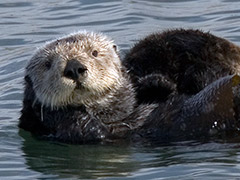Protecting The Little Sea Otter: Center of a Major Debate
Jun 07

There is much controversy on the topic of preservation for the higher level food chain predators. The fishermen are hell bent on taking their complaint to the state capitols as well as Washington, D.C. You see, they don’t like the sea otters because they consume what the fishermen want to catch and sell. Yes, it always comes down to the almighty dollar, doesn’t it?
There are some considerations at play here, some in Washington, D.C. as they try to balance the needs of the sea otter with the needs of the fishing industry. One proposal is via the U.S. Fish and Wildlife Science regarding the Southern California law (of 24 yrs or so) entitled the “no otter zone”. These are areas that indicate if any sea otters are captured, they are to be relocated. There is another bill in Congress that would reinstate the ability for trade in sea otter fur only from sea otters that are trapped in southeast Alaska and used for subsistence. This little point seems to raise my eyebrows, as it will open up too many loopholes.
There is growing research that is pointing to other beneficial reasons to not disturbing the sea otter. Kelp forests are the main North Pacific marine ecosystem foundation. They are proven wilderness areas that support a variety of fish and act as food for varied species. Thy also help to buffer the shorelines from exposure to waves and assist in the reduction of the erosion of coastal areas. The sea otters themselves are a main key to keeping healthy coastal kelp. Sea otters are the major predator for urchins. Without the sea otter, the urchin population would grow to an out of balance proportion that they would affect the kelp forests and we would lose the benefits of the kelp as an ecological factor.
Source:
www.pewenvironment.org
Related Posts
- Why Are Fossil Fuels Bad for the Environment?
- What Happens Inside a Power Plant?
- Nordic Energy Research Collaborates on 2050 Carbon Neutral Path
- Hottest Sustainability Trends To Watch
- Smartphone Technology to Make Greener Choices
Leave a Reply
You must be logged in to post a comment.




